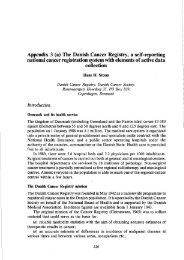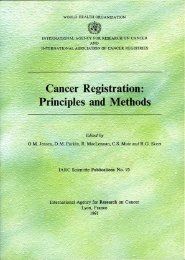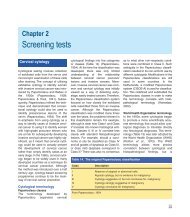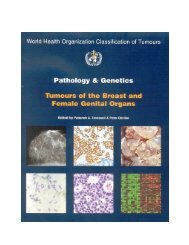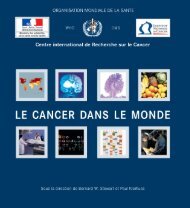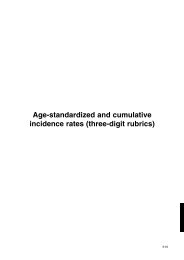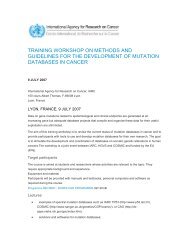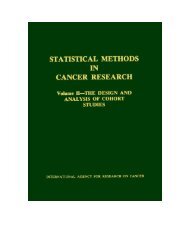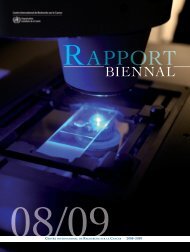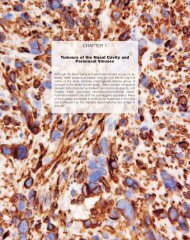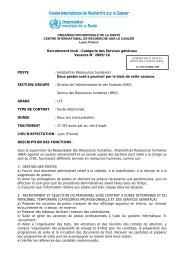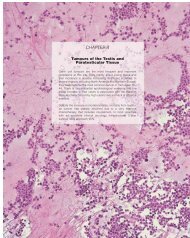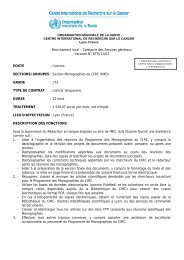world cancer report - iarc
world cancer report - iarc
world cancer report - iarc
You also want an ePaper? Increase the reach of your titles
YUMPU automatically turns print PDFs into web optimized ePapers that Google loves.
Fig. 2.53 Fruit consumption is associated with reduced risk of <strong>cancer</strong> (according to results of meta-analyses). Findings are essentially similar for vegetable consumption.<br />
Salt and salt-preserved foods<br />
Consumption of salt added to food and<br />
salt-preserved foods has been investigated<br />
mainly in relation to <strong>cancer</strong>s of the<br />
stomach, colorectum and nasopharynx.<br />
Several studies conducted in Europe,<br />
South America and Eastern Asia have<br />
<strong>report</strong>ed increased relative risks of stomach<br />
<strong>cancer</strong> in relation to the consumption<br />
of salt and salt-preserved foods, particularly<br />
in populations with high stomach<br />
<strong>cancer</strong> incidence and high salt intake (Fig.<br />
2.54). Salted, smoked, pickled and preserved<br />
food (rich in salt, nitrite and preformed<br />
N-nitroso compounds) are associated<br />
with increased risk of gastric <strong>cancer</strong>.<br />
Such high salt intake, together with<br />
Helicobacter pylori infection, may contribute<br />
to the development of atrophic<br />
gastritis, and hence gastric <strong>cancer</strong>.<br />
Domestic refrigeration and reduced salt<br />
consumption are likely to have contributed<br />
to the observed decreased stomach<br />
<strong>cancer</strong> incidence in developed countries<br />
during the 20th century [5].<br />
Consumption of Chinese-style salted fish<br />
has been specifically associated with<br />
increased risk of nasopharyngeal <strong>cancer</strong><br />
in South-East Asia [6], whereas European-<br />
style salted fish (e.g. anchovies and<br />
salmon) has not been found to be associated<br />
with any increase in <strong>cancer</strong> risk.<br />
Several biological mechanisms have been<br />
proposed to explain the association<br />
between Chinese-style salted fish and<br />
nasopharyngeal <strong>cancer</strong>, including partial<br />
fermentation and nitrosamine formation.<br />
The relationship of salt and salt-preserved<br />
foods with colorectal <strong>cancer</strong> seems to be<br />
of a different nature. Firstly, it has been<br />
observed particularly in Western populations<br />
and secondly, it mainly involves<br />
foods such as cooked and raw ham, various<br />
types of salami, European-style charcuterie,<br />
bacon and other salt-preserved<br />
pork (see next section).<br />
Meat<br />
Epidemiological studies on meat consumption<br />
and <strong>cancer</strong> risk support the<br />
existence of a specific association with<br />
colorectal <strong>cancer</strong> risk (Figs. 2.57, 2.58).<br />
This association, however, seems to have<br />
been found more consistently for consumption<br />
of red meat (beef, lamb and<br />
pork) and processed meat (ham, salami,<br />
bacon and other charcuterie) for which<br />
consumption of 80 g per day may increase<br />
colorectal <strong>cancer</strong> risk by 25 and 67%,<br />
respectively [7].<br />
Several biological mechanisms have been<br />
investigated which could explain the possible<br />
effect of meat consumption on<br />
colorectal carcinogenesis. These include<br />
the influence of meat and/or fat consumption<br />
on the production and metabolism<br />
of bile salts and bile acids by gut flora<br />
[8]. Other hypotheses concern the potential<br />
carcinogenic effect of certain compounds<br />
that can be formed in meat during<br />
cooking, such as heterocyclic amines [9]<br />
and polycyclic aromatic hydrocarbons or<br />
as a consequence of preserved meat processing<br />
(nitrates and nitrites) or endointestinal<br />
metabolism (various N-nitroso<br />
compounds) (Food contaminants, p43).<br />
Protein, carbohydrates and fat<br />
The results of epidemiological studies on<br />
macro-nutrients (for example, proportion<br />
of total diet as protein) have so far been<br />
much less consistent in establishing an<br />
associated risk of <strong>cancer</strong> that those on<br />
foods. No clear risk patterns have<br />
emerged for consumption of protein.<br />
Some studies on oesophageal <strong>cancer</strong> in<br />
populations with high alcohol intake found<br />
Diet and nutrition<br />
63



